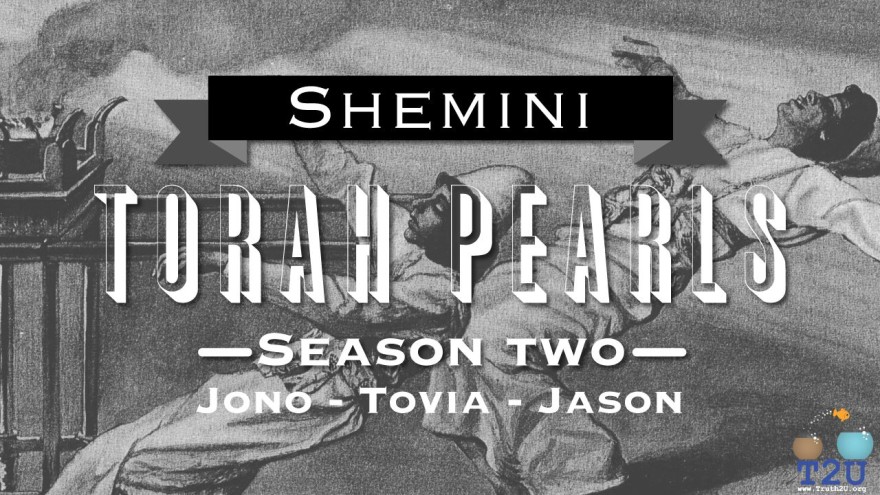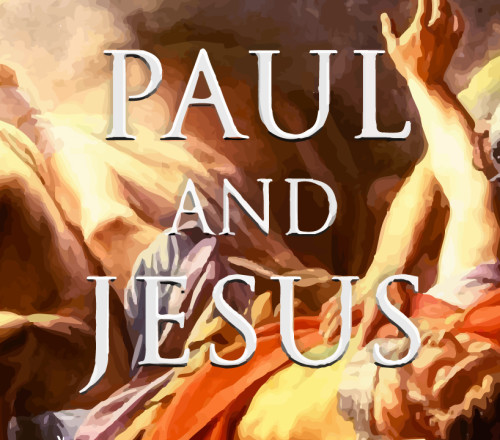Torah Pearls – Season 2 – Shemini – Rabbi Tovia Singer, Jono & Jason
Then Nadab and Abihu, the sons of Aaron, each took his censer and put fire in it, put incense on it, and offered profane fire before the Lord, which He had not commanded them. So fire went out from the Lord and devoured them, and they died before the Lord. – Leviticus 10:1-2
Join us for this year’s Tanakh Tour of Israel!
[karma_by_kadar__simple_player title=”Truth2U” src=”https://truth2u.org/wp-content/uploads/Audio/Truth2U%20-%20Torah%20Pearls%20-%20Season%202%20-%20Shemini.mp3″ volume=”0.9″ autoplay=”true” downloadable=”true” color=”1″]
[wp-post-slider]





G’Day. Thanks for a great discussion. Tovia said that Moses was upset that the people wanted him to speak to Gd for them; however, Hashem said the people spoke well. I have always wondered WHY Hashem said that.
Deut 5:25 ‘Now then why should we die? For this great fire will consume us; if we hear the voice of the L-RD our God any longer, then we will die. 26‘For who is there of all flesh who has heard the voice of the living God speaking from the midst of the fire, as we have, and lived? 27‘Go near and hear all that the L-RD our God says; then speak to us all that the L-RD our God speaks to you, and we will hear and do it.’
28“The L-RD heard the voice of your words when you spoke to me, and the L-RD said to me, ‘I have heard the voice of the words of this people which they have spoken to you. They have done well in all that they have spoken.
Can you please comment on this?
Sorry, the previous statement referred to the discussion about the ‘mediator.’
What is to comment? Read the very next line and you will have your explanation. “If only their hearts would always remain this way, where they are in such awe of Me. They would then keep all My commandments for all time, so that it would go well with them and their children forever.” D’varim / Deuteronomy 5:26.
When Moses heard G-d speaking from the burning bush he was afraid. Can you imagine the awe of the entire nation hearing G-d speak? They were afraid — as Moses himself had been afraid earlier. Moses felt the people were lowering their spiritual level by not continuing to communicate directly with G-d. Yet G-d Himself said the Jews words were proof of their great awe that they had for Him — and this is why He was pleased with their answer. Their fear was due to humility — they felt unworthy of being on such a high level. As it says in Mislei (Proverbs) 22:4 “As a result of humility comes fear of HaShem.”
Having seen all that G-d has done to and for ALL the people just think, Ida, IF Moses misled or miscommunicated one thing what would have prevented G-d from once again communicating directly — or killing Moses for misleading people as He slayed Aaron’s sons for bringing an unauthorized sacrifice?
The people trusted G-d, and thus He was pleased. “If only their harts would always remain this way, where they are in such awe of Me. . .”
Ida, also go back a few lines “The L-rd spoke these words to your entire assembly at the mountain out of the midst of the fire, the cloud, and the opaque darkness, with a great voice, which did not cease. And He inscribed them on two stone tablets and gave them to me.” D’varim / Deuteronomy 5:19.
G-d spoke to the entire nation of Israel. Sh’mot / Exodus 19:17 “Moses led the people out of the camp toward the Divine Presence. They stood transfixed at the foot of the mountain” — and then G-d spoke to the entire nation (chapter 20).
When G-d stated that the people did well He was referring the people telling G-d that they will do as He commanded. G-d was pleased that the people accepted the covenant with Him.
Sh’mot / Exodus 19:5 “Now if you obey Me and keep My covenant, you shall be My special treasure among all nations, even though all the world is Mine. . .
Sh’mot / Exodus 19:8 “All the people answered as one and said, ‘All that G-d has spoken, we will do.'”
Three separate Torah versus tell us that we Jews accepted the obligations (mitzvot) of the Torah, but only the last of these contains the now-famous phrase “na’aseh v’nishma.” When Moses first ascends to Mount Sinai, G-d commands him to tell the people that if they accept the covenant, G-d will make them a “kingdom of priests and a holy nation” (Sh’mot / Exodus 19:6). Upon hearing these words, the people respond, “All that G-d has said, we will do” (Sh’mot / Exodus 19:8).
“Later in the text, after Moses relates specific divine rules to the people, they again say, “All of the things that G-d has said, we will do” (Sh’mot / Exodus 24:3). A few verses later, after Moses writes and reads aloud the words of the Torah, the people utter the phrase “na’aseh v’nishma,” “We will do and we will hear” (Sh’mot / Exodus 24:7).”
In D’varim 5 Moses is reiterating what happened in Sh’mot (Exodus) 19-20. “G-d your L-rd made a covenant with you at Horeb (Sinai).” D’varim / Deuteronomy 5:2. Moses is reminding the people that they agreed to do as G-d commanded, and that this agreement pleased G-d.
The people said “when G-d speaks to man, he can still survive” (D’varim / Deuteronomy 5:20), yet they felt overwhelmed and unworthy. Hope this helps you understand it a bit more.. . .
Thank you, Jono, for providing this rich source of information. I so appreciate everyone’s insights each week. I have a rather convoluted question for Tovia. Would you please expound on the Jewish understanding of the following terms in 20 minutes or less? ;),
Redemption
Atonement
Sin
Repentance
Thank you
Mari, in Hebrew redemption is גְּאֻלָּה (geulah). It means freedom, delivery (as in our freedom from slavery). When we speak of the final redemption we mean the time of the messiah when the Jewish people will be gathered from all the points of the world and brought to Israel where they will be safe and secure. There will be no persecution, no threats of annihilation, no external or internal threats.
When Jews say כפרה (kopher / “atonement”) we mean the process by which any number of acts (mostly without blood) of either offering or tshuvah or charity provides merit and purpose for one’s soul/spirituality. Atonement is a process (not a “one time” thing). We atone (or cover) our mistakes, misdeeds, etc. The mistake that atonement of sin requires a blood sacrifice comes from a mis-reading of Leviticus 17 where Jews are forbidden from EATING blood and told its only purpose is on the altar or to be thrown away into the dirt (Leviticus 17:13).
Yet the bible tells us that charity atones: Daniel 4:24. “Indeed, O king, may my counsel please you, and with charity you will remove your sin and your iniquity by showing mercy to the poor; perhaps your tranquility will last.”
How about money? “You shall take the atonement money from the sons of Israel and shall give it for the service of the tent of meeting, that it may be a memorial for the sons of Israel before HaShem, to make atonement for souls.”
And jewelry too — atones for the soul the same as blood and money: Numbers 31:50 We therefore want to bring an offering to G-d. Every man who found any gold article [such as] and anklet, a bracelet, a finger ring, and earring, or a body ornament [wishes to bring it] to kafar (atone) for our nefesh (life force / soul) before G-d.’
The Torah says that the blood of kosher animals atones (for only very specific and generally minor mistakes) — it doesn’t say that ONLY blood atones. This concept was added by the Greek Text to explain the need for Jsus to die for them. It is like saying “pizza is food — ergo the only food in the world is pizza.”
The word translated as “sin” is a very minor mistake (a missing of the mark) in Hebrew. A חֵטְא / cheit is an unintentional sin through carelessness — a “missing of the mark.” Most sacrifices (qorban) had nothing to do with sins — and those which did were very specific . A sin qorban (חטאת / chatat sacrifice) was for accidental sins. Many things atone for “sin” (a cheit). Daniel 4:24 is chatat and avon by showing mercy and kindness. 2 Samuel 12:13-14 is a cheit (David admits to sin before Nathan the prophet and repents). 1 Kings 8:46-50 “sin” and far more serious infractions (willful disobedience to G-d for example) are atoned for by prayer. Those are just a few examples.
Lastly you asked about repentence. Repentence (truly being sorry for something you did, and vowing to not repeat the offense) can be atoned for in many ways. 2 Samuel 12:13-14 is a cheit (David admits to sin before Nathan the prophet and repents), Jonah 3:10 has to do with the sins of Nineveh (unspecified, just identified as “evil” in 1:2), the people repented and G-d forgave, Leviticus 26:40-42 speaks of avon and repentence atoning for it and Ezekiel 18:21-32 speaks of chatat (21), pesha (22), chatat (24), pesha (28), pesha and avon (30) are all atoned through repentance. Pesha is the worst kind of wrongdoing — something evil done in direct willfulf disobedience to G-d. An avon is a lustful or impulsive wrongdoing — you knew was wrong but “couldn’t help yourself.” Both an avon and pesha cannot be atoned for with a blood sacrifice, but they can be atoned for with true repentence.
To repent one must confess their sin to G-d. You would say ‘I beseech you, HaShem, I have sinned, I have acted perversely, I have transgressed before You, and have done thus and thus, and lo, I am contrite and ashamed of my deeds and will never do this again.” This must be sincere. The more one confesses and elaborates on this matter, the more praiseworthy. If there is a Temple and one is able to bring a sacrifice one should do so. Sacrifice alone cannot bring acquittal; confession is a sine qua non, and without it repentance cannot take place. http://www.myjewishlearning.com/article/the-dimensions-of-repentance/
I hope that helps to answer your questions.